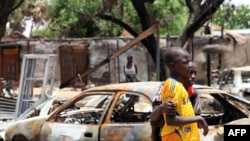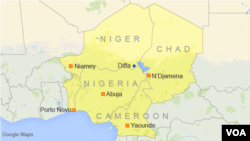The border between Nigeria and Cameroon has been completely reopened for the first time in three years. It’s a key sign of progress in the war against Boko Haram. Officials from the two countries met this week in Yaounde to review security issues.
They were welcomed by a military band before sitting down to discuss Boko Haram.
Officials here say the threat of terrorist attacks has been greatly reduced due to joint cross-border military raids targeting the Islamist militant group.
They say that the border between Cameroon and Nigeria is now completely reopened, a process that began last month.
"Only a secured environment can provide avenue for meaningful trade and commercial activities as well as unimpeded exchange of goods and services," General Abba Mohammad Dikko, the head of the Nigerian delegation told VOA.
"The unflinching cooperation and support of Cameroon has indeed curtailed the menace of the Boko Haram sect in all its ramifications. Success against Boko Haram will end movement of refugees across boundaries and create an enabling environment for the return and repatriation of internally displaced persons back to their ancestral lands," he added.
Insurgency origin
The Boko Haram insurgency began in northeastern Nigeria in 2009, eventually spreading to neighboring Cameroon, Chad and Niger. The conflict has displaced 2.7 million people, according to the U.N. At least 20,000 people have died in the violence.
But an end to the conflict, while welcome, will present fresh issues, said Professor Saibou Issa, a historian and member of the Cameroon delegation.
"We know today that thousands of people especially young men from Cameroon, Nigeria and Chad joined Boko Haram," said Issa. "As progressively Boko Haram attacks are diminishing, it is may be time to think about how the states are going to cope with these young people. There is the challenge of managing the vigilantes who are contributing a lot in fighting against Boko Haram."
Cameroon’s northern border areas were hit hard by the insurgency. Farming and trade ground to a halt. But the area is slowly returning to life, said the governor of the Far North region of Cameroon, Midjiyawa Bakari.
"We have been authorized by the heads of state to open the border between Nigeria and Cameroon and people are very happy," Bakari said. "Schools have been reopened. We have trucks coming from Maiduguri to N'djamena through Fotokol, Cameroon, and from Cameroon to Nigeria and also the cows.”
Security concerns remain, with both countries warning about Boko Haram’s continued use of female suicide bombers, described by officials here as the last lashes of a dying monster.





